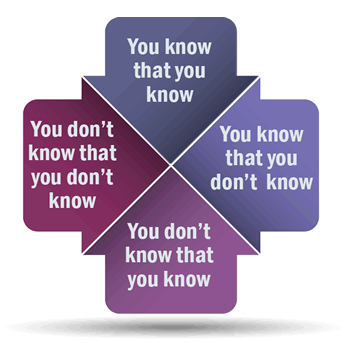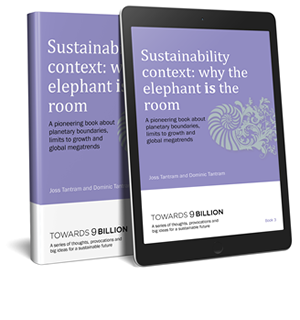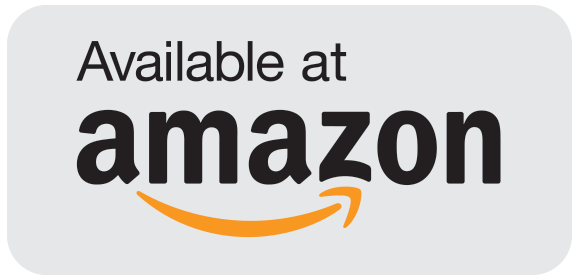The elephant is the room
“How far you can go without destroying from within what you are trying to defend from without?”
Dwight D. Eisenhower
This piece is a mildly revised version of a blog commissioned by 2degrees as part of a series of future-gazing pieces from sustainability thought leaders on the big issues for the agenda in 2015 and beyond.
This version has more elephants in it.
There is much more to be said on the issues of context related sustainability, Planetary Boundaries and the multiple capitals approach than is included below. We intend to evolve and publish some further ideas on the challenges and opportunities of measuring and locating absolute sustainability in the context of the planet’s limits in further blogs in 2015 (and perhaps beyond).
Context is everything
Known unknowns and unknown unknowns
Predicting the future is always difficult, as Donald Rumsfeld so famously said (and was perhaps unjustly ridiculed for): there are known knowns (things we know we know), known unknowns (things we know we don’t know) and unknown unknowns (things that we don’t know that we don’t know). In addition, the philosopher Slavoj Žižek also suggests a further category, of unknown knowns (things that we don’t know – or wilfully fail to remember – that we know).
Sticking to the first two categories, I will try to explore one of the biggest issues companies need to face up to in 2015 – the challenge of context. To locate their strategies for sustainability and impact management within the frame of what is physically sustainable in the long term.
The elephant is the room
In sustainability, many topics are routinely labelled as being the ‘elephant in the room’. These supposedly ‘hot-button’ but routinely ignored issues vary from population concern, capitalism, water scarcity, economic growth, vested interests, regulatory capture, political inertia, consumer disinterest, advertising and pretty much anything you care to mention that drives people to CAPITALISE their writing INDISCRIMINATELY in on-line discussion fora.
For companies to really get sustainability and be on a meaningful pathway to true sustainability (rather than relative unsustainability) the elephant they need to deal with is not just in the room but it is the room.
The animal which is metaphorically in question is sustainability context – the idea of positioning the scope for company activities, intent and performance within the planet’s capacity to support and sustain that activity without undermining the planet’s core functions
The best expression of what is physically possible, the best scientific ‘guess’ at the limits of sustainability, is described by the concept of Planetary Boundaries. A clear offspring of the Club of Rome’s 1972 Limits To Growth, the Nine Planetary Boundaries were developed by Johan Rockström et al in a 2011 paper in Nature and are at the heart of the popular Doughnut model developed by Kate Raworth while at Oxfam.
Put simply, it’s a concept seeking to identify and quantify aspects of the Earth’s natural systems which present close-to-absolute thresholds we should not cross.
Expressing limits is a notoriously difficult activity (see here for more on this issue) and predicting exactly where such thresholds lie has long been fraught. From Malthus to the Club of Rome to Peak Oil, each attracted criticism over the predictions they made. However it is possible to be right in principle but wrong on a point of detail. When it comes to limits the fact that we live on a single planet substantially closed to matter though open to energy means that we are born into an existence with observable (though large) inherent limits (unless or until we make it out of the gravity well and into space).
To put it simply, Jumbo may be big, but there is no such thing as an infinite elephant.
Relating company performance and intent to the big picture
Recently we have been having conversations about the growing trend of relating big picture global sustainability issues to individual organisations. This is happening in a number of areas. It is well underway in terms of climate and GHG emissions reporting and is growing for natural capital through the development of the ‘multiple capitals’ approach. In addition, people are starting to explore how they might understand company performance and scope for impact with reference to the concept of Planetary Boundaries.
For a company, relating their activities to specific Planetary Boundaries calls for an understanding of cause and effect that does not exist yet. However, there are some possibly useful ways of relating Planetary Boundaries and Multiple Capitals to individual organisations. A key approach might be to adapt the GHG Protocol’s Scopes approach, which assigns differential responsibilities to various aspects of overall impact.
A Scopes approach to Planetary Boundaries?
Scopes have been used by organisations utilising the GHG Protocol as a means to define boundary issues and help condense and navigate complexity. Under this scheme, organisations analyse their impacts in the following three categories:
- Scope 1 – direct impacts arising from organisational activities.
- Scope 2 – indirect impacts arising from purchased energy.
- Scope 3 – indirect impacts arising from a variety of sources in the total value chain (to the company and from the company).
I believe that 2015 will see some interesting developments along this line, either cross-applying the Scopes to Planetary Boundaries or by developing and implementing the multiple capitals architecture articulated by the International Integrated Reporting Council’s (IIRC) Capitals Framework.
Work is already being conducted along these lines, the Sustainability Context Group is focussed upon just this challenge, and the MultiCapital Scorecard initiative has produced tools to seek to measure and report performance across the varied dimensions of the capitals.
However, the answer is always the same – be kind to the elephant
Of course the challenge with all this analysis is that it doesn’t change the necessity for change or the direction of that change, both of which are generally clear before analysis takes place.
Perhaps the only thing a company should do, when considering their relationship to Planetary Boundaries, is to define and develop products and services which innately strengthen or reinforce the Boundaries. Of course, implicitly, this will require curtailing and then ceasing activities and processes that undermine the boundaries.
Therefore, while it can be critical to understand the impact of company activities upon Planetary Boundaries and Multiple Capitals, activities measuring relative unsustainability should be no more than a step on the path to developing innately sustainable strategic intent and action.
Resolving the tension between the way we do business and the way our planet works, so that growth in economic activity does not undermine the potential for future growth is a significant challenge.
The steps taken in 2015 on this journey will hopefully make a key contribution to overcoming this challenge. We must first recognise that context is everything, and then turn our human creativity and capacity for great endeavours towards making the planet a fit and fertile place for elephants, humans and all life alike.
Further reading
More ideas on capitals and context can be found in ‘The elephant is the room’, the third of our Towards 9 Billion book series, designed to provide inspiration, hope and practical ideas for everyone working to build a sustainable future. 
There are 5 in the series and each is available as an eBook or a hardcopy version from Amazon.

You can also access free excerpts of each book directly from us by going to www.terrafiniti.com/towards-9-billion-books
The original version of this piece was published by 2degrees on 5/01/2015. This version was also republished by Sustainable Brands on 02/03/2015.
I help busy people in ambitious companies explore their sustainable future. While I don't know if we're a good fit for your business, why not contact me so I can learn more about your unique challenges?
Get in touch
 All capitals are unequal, but some are more unequal than others
All capitals are unequal, but some are more unequal than others
Leave a Reply